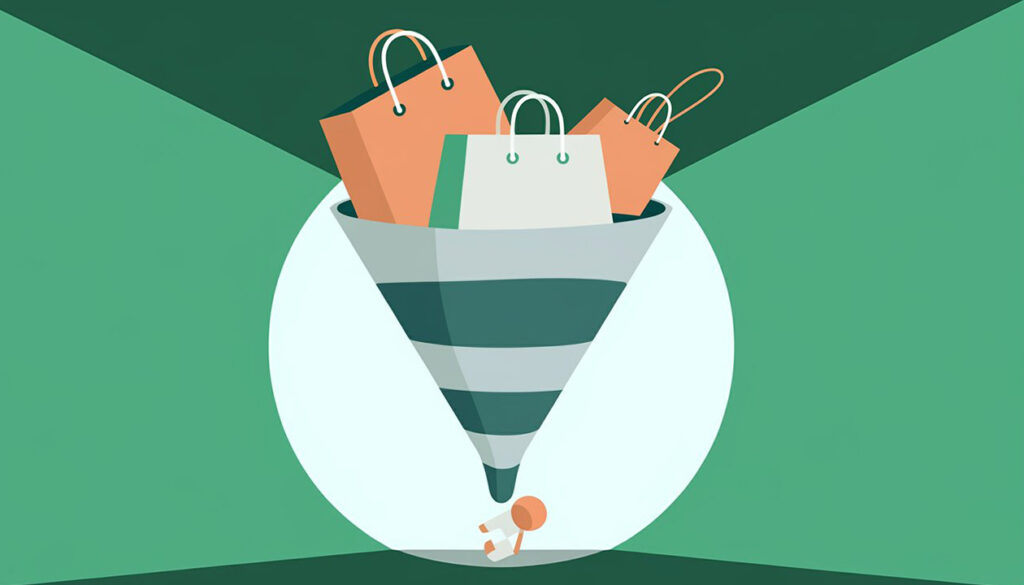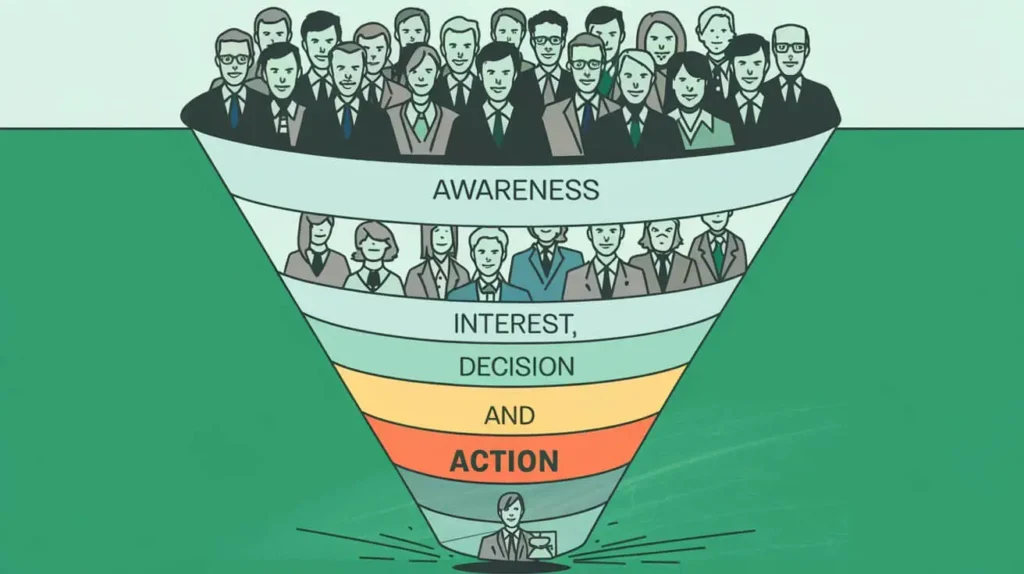Sales funnels are the backbone of your online business success, transforming casual website visitors into loyal customers who actually buy your products.
While the right ecommerce funnel builder can maximize your ROI and boost sales, choosing one isn’t easy. The market offers options ranging from ClickFunnels at $97 per month to Systeme.io‘s free plan that includes three sales funnels. That’s why many businesses struggle to find the perfect balance between features and cost, especially considering that managing sales funnels can cost upwards of $320 monthly.
If you’re looking for the best funnel builder for your online store, we’ve thoroughly tested and compared the top 10 ecommerce funnel builders that deliver real results in 2025. From user ratings and pricing to features and integration capabilities, we’ll help you make an informed decision without breaking the bank.
What Is an Ecommerce Funnel
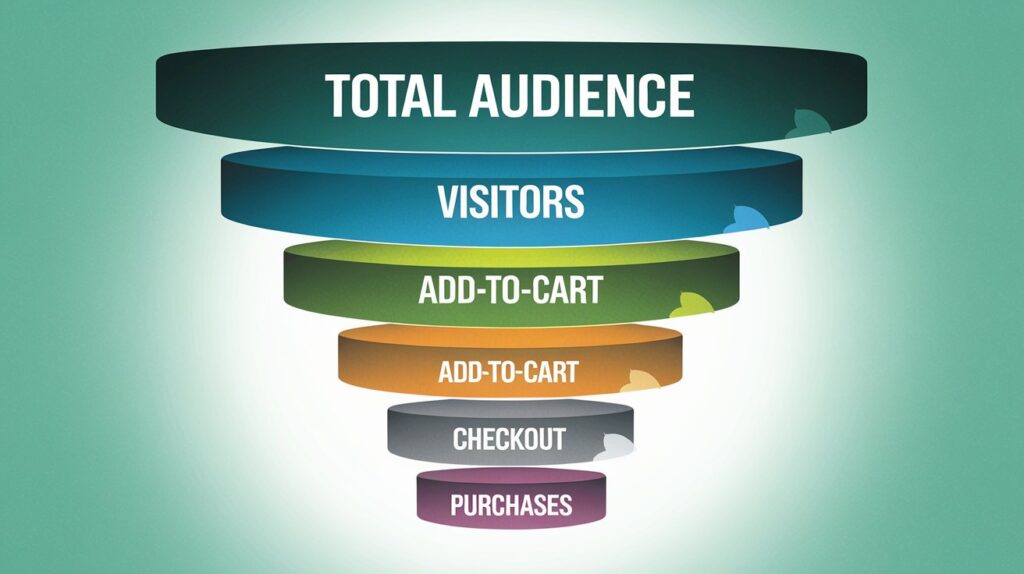
An ecommerce funnel represents the customer’s journey through your online store, from their first interaction to final purchase. Picture a cone-shaped structure – wide at the top where potential customers enter, and narrow at the bottom where conversions happen.
The funnel concept helps categorize people in your marketing ecosystem, specifically for online stores. Unlike traditional business models, ecommerce funnels focus on digital touchpoints and online buying behaviors. For instance, while enterprise software companies might emphasize lengthy demos and consultations, ecommerce funnels primarily track website visits, cart additions, and checkout completions.
Each industry’s customers follow unique paths when making purchases. Furthermore, the length of your funnel often depends on your product type. Lower-cost items like beauty products or apparel typically have shorter funnels, whereas luxury items such as high-end watches or vehicles require longer customer journeys.
The funnel structure serves two key purposes. First, it helps visualize the number of potential customers at each stage. Additionally, this framework enables you to tailor marketing strategies for different stages of the buying process. Consequently, you can identify where customers might drop off and implement targeted improvements to boost conversion rates.
Your ecommerce funnel isn’t just a fixed path or marketing strategy – it’s a dynamic tool that helps understand and optimize the entire customer experience. By mapping out these stages, you can better guide potential customers from their initial product discovery to becoming loyal buyers.
Ecommerce Funnel Stages
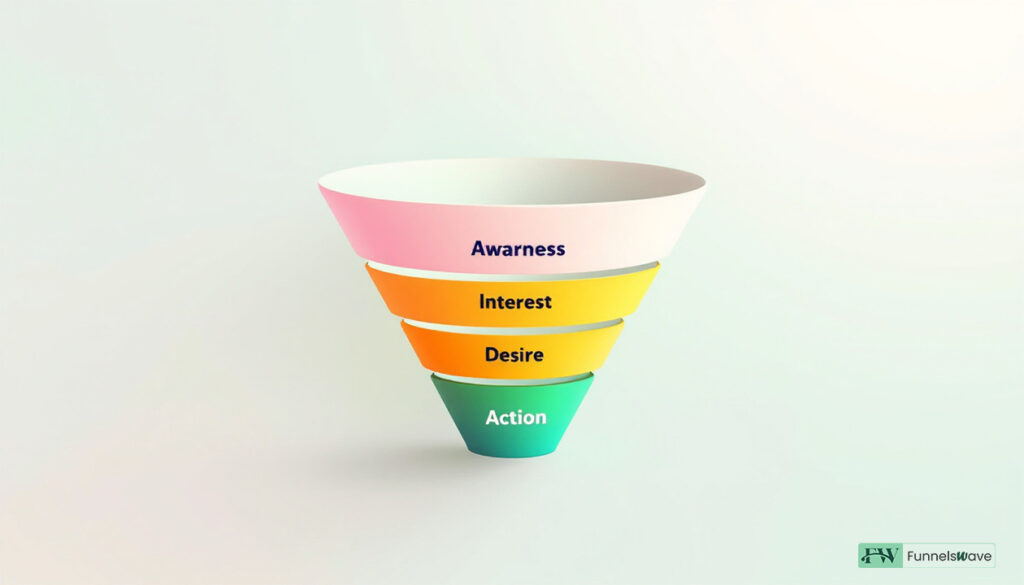
Every successful ecommerce funnel moves through four distinct stages, each requiring specific strategies to guide potential buyers toward purchase.
The journey begins with the Awareness Stage, where potential customers first discover your brand. During this phase, buyers search for answers to broad questions about their needs. Marketing efforts primarily focus on reaching people who would genuinely be interested in purchasing, rather than casting an overly wide net.
Moving into the Interest Stage, prospects begin narrowing down their options. At this point, buyers have enough information to start evaluating different choices and are committed to making a purchase. They spend time researching product categories and comparing various solutions.
The Desire Stage marks a crucial transition where customers become emotionally invested in buying. During this phase, buyers actively read reviews and compare your brand with competitors. Marketing efforts should shift toward highlighting your unique value proposition and leveraging customer testimonials to build credibility.
The journey culminates in the Action Stage, where customers make their final purchase decision. This stage requires removing any friction from the checkout process. Notably, successful conversion at this point depends on offering multiple payment options, clear shipping information, and streamlined form fields.
Moreover, sophisticated marketers recognize that the funnel extends beyond the initial purchase. Post-purchase engagement through loyalty programs and referral systems can turn one-time buyers into brand advocates. According to recent data, customers are 27% likely to return after one purchase, with this probability increasing to 49% after the second purchase and 62% after the third purchase.
ClickFunnels
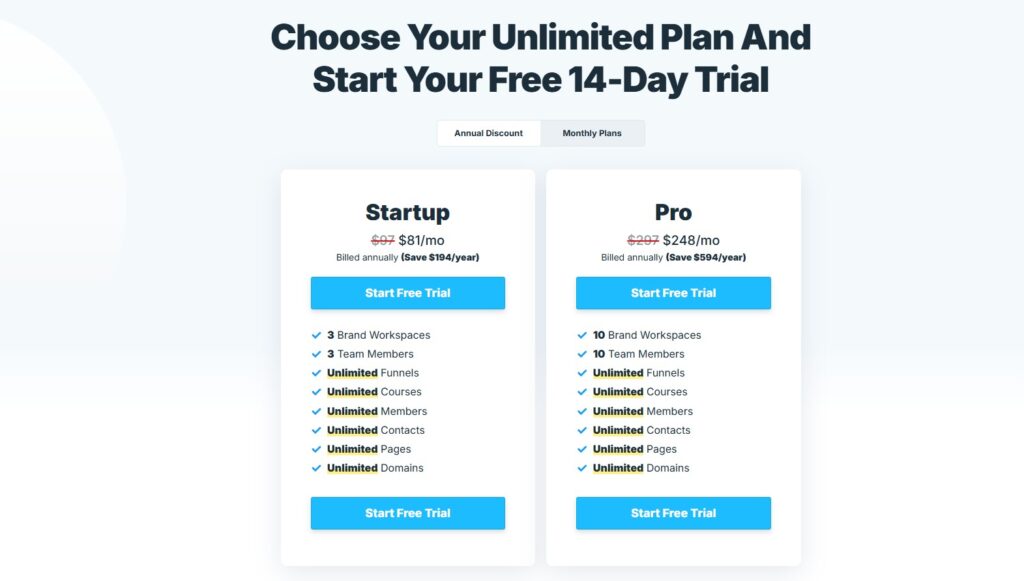
ClickFunnels stands out as a comprehensive marketing platform designed to help businesses sell products and services online.
Platform Overview
Primarily focused on funnel building, ClickFunnels has evolved into an all-in-one solution offering website creation, email marketing, and advanced ecommerce capabilities. The platform serves over 100,000 businesses worldwide, providing tools to guide potential customers through structured buying journeys.
ClickFunnels Features for Ecommerce
The platform offers robust ecommerce functionality through its Store Funnels feature. Indeed, you can create product pages, manage variants, and automate upsells seamlessly. The drag-and-drop editor enables quick webpage creation without coding knowledge, therefore making it accessible for businesses of all sizes.
Integrations
ClickFunnels connects with numerous third-party applications, including:
Email services: ActiveCampaign, AWeber, ConvertKit
CRM platforms: HubSpot, Keap, Pipedrive
Event platforms: GoTo Webinar, Zoom
Payment processors: Stripe, PayPal
ClickFunnels Pricing & Plans
The platform offers two main pricing tiers:
Startup: USD 97.00/month (3 workspaces, unlimited funnels)
Pro: USD 297.00/month (10 workspaces, unlimited funnels)
Both plans include unlimited courses, members, contacts, and domains.
Pros and Cons
Pros:
Advanced sales funnel capabilities
User-friendly drag-and-drop builder
Comprehensive A/B testing features
Built-in CRM functionality
Nevertheless, some limitations exist:
Higher cost compared to competitors
Limited website themes
Still developing certain features
ClickFunnels Integration with Shopping Platforms
The platform seamlessly integrates with Shopify, allowing you to manage fulfillment and shipping directly through your store. Orders placed through ClickFunnels automatically sync with your Shopify account, streamlining the entire sales process and reducing manual data entry.
Systeme.io
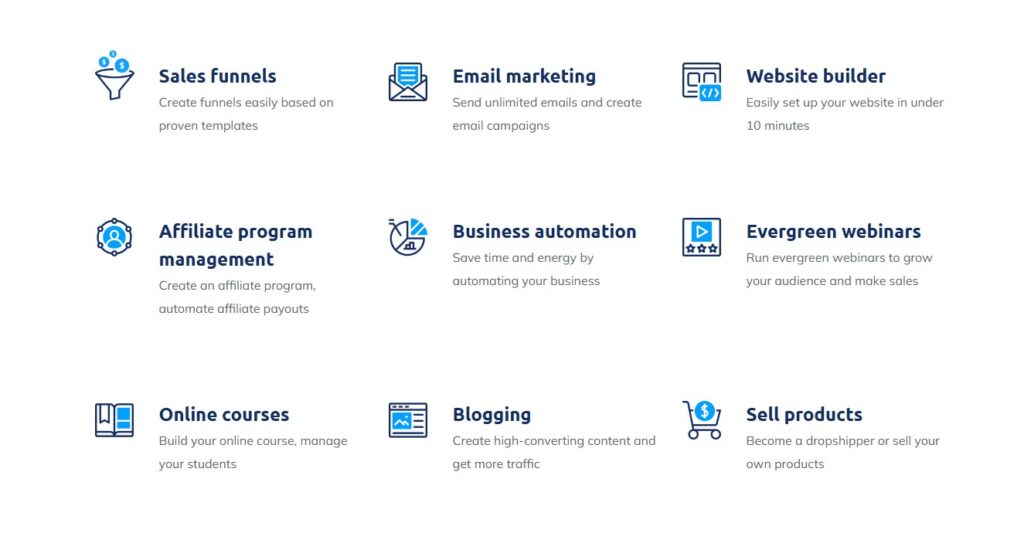
As an emerging competitor in the ecommerce funnel builder space, Systeme.io has gained trust from over 300,000 entrepreneurs worldwide.
Platform Overview
Systeme.io positions itself as a comprehensive marketing solution, offering sales funnels, email marketing, and website building capabilities in one unified platform. The platform primarily focuses on simplifying online business operations through automation and integrated tools.
Systeme.io Ecommerce Features
The platform provides unlimited storage and bandwidth for listing physical and digital products. Subsequently, you get access to:
A drag-and-drop website builder for store creation
Sales funnel templates for conversion optimization
Email marketing tools for lead generation
Business automation features for repetitive tasks
Integrations
Systeme.io connects with multiple payment processors, including Stripe, PayPal, Flutterwave, Razorpay, and Mollie. The platform also offers API access for custom integrations and supports workflow automation through Zapier.
Systeme.io Pricing Structure
The platform offers four distinct pricing tiers:
Free Plan: Includes 3 sales funnels and 2,000 email contacts
Startup Plan: USD 27.00/month with expanded capabilities
Webinar Plan: USD 47.00/month with additional features
Unlimited Plan: USD 97.00/month with complete access
Alternatively, annual billing provides a 30% discount across all paid plans.
Pros and Cons
Advantages:
Unlimited file storage across all plans
No transaction fees on payments
Built-in affiliate program management
24/7 customer support with 2-hour response time
Limitations:
Basic automation capabilities
Limited design customization options
Advanced API features restricted to higher plans
Systeme.io Platform Integration Options
The platform ultimately offers two integration methods: direct API connections and Zapier automation. Through Zapier, you can connect with thousands of apps for tasks like contact management, campaign tracking, and webinar registration.
CartFlows
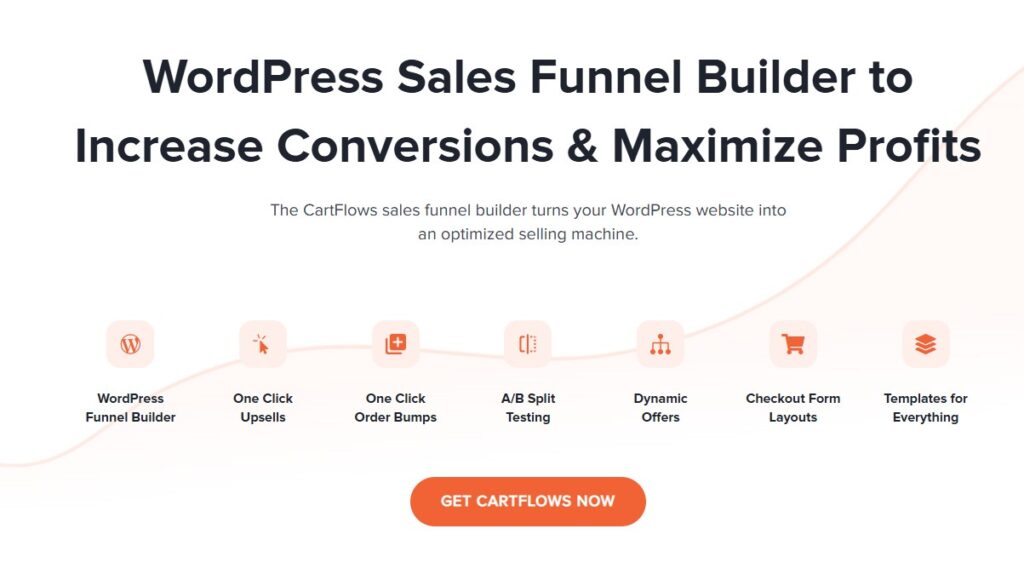
Launched in November 2018, CartFlows has rapidly grown into a powerful sales funnel builder designed specifically for WordPress and WooCommerce stores.
Platform Overview
CartFlows transforms WordPress websites into optimized selling machines through its extensive library of conversion-focused templates. Since its inception, the platform has been implemented on over 223,000 websites, primarily serving ecommerce entrepreneurs and consulting agencies.
CartFlows Ecommerce Capabilities
The platform’s Modern Checkout feature offers real-time account validation, address field autofill, and customizable form fields. Essentially, CartFlows enables dynamic offers based on customer data points, alongside unlimited conditional order bumps to boost revenue. The platform’s Canvas Mode helps visualize customer journeys end-to-end, making it easier to identify optimization opportunities.
Integrations
CartFlows seamlessly works with major payment gateways:
PayPal Standard and Express Checkout
Stripe Payment Gateway
Authorize.Net (Credit Card option)
Mollie (Credit Card and iDEAL)
Square Payment Gateway
WooCommerce Payments
CartFlows Cost & Plans
The platform offers three distinct pricing tiers:
Starter: USD 99.00/year
Plus: USD 199.00/year
Pro: USD 299.00/year
Pros and Cons
Advantages:
Complete funnel customization control
Extensive template library
Native WordPress integration
No monthly SaaS fees
Limitations:
Requires WordPress and WooCommerce
Setup time for new stores
Some features limited to Pro plan
CartFlows WooCommerce Integration
The platform functions as a native extension of WooCommerce, offering complete compatibility with existing WooCommerce payment gateways and extensions. Primarily, this integration enables seamless order processing, subscription handling, and inventory management directly within your WordPress dashboard.
Kartra
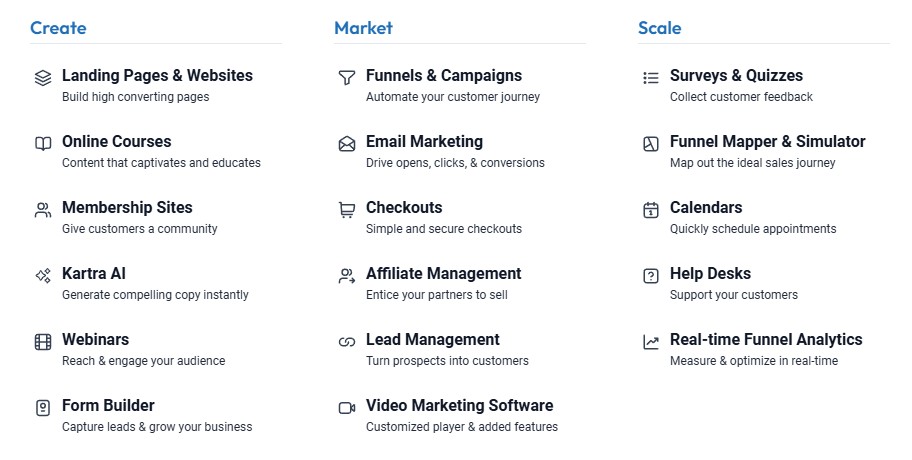
Kartra positions itself as a powerful all-in-one platform that combines marketing automation with robust ecommerce capabilities.
Platform Overview
Primarily designed for online businesses, Kartra offers landing page creation, email marketing, and membership portal management. The platform enables fast-track selling through pre-built marketing campaigns and automated sales funnels.
Kartra Ecommerce Tools
The platform’s ecommerce suite includes customizable checkout pages, bump offers, and cart abandonment recovery. Generally, Kartra allows multiple price points setup and supports various payment options. The platform’s AI-powered system analyzes customer behavior patterns to optimize sales strategies.
Integrations
Kartra seamlessly connects with major payment processors:
Payment gateways: Stripe, PayPal, Authorize.net, Braintree
Email services: SendGrid, MailGun, Elastic Mail, Postmark
Calendar services: Google Calendar, Google Meet, Zoom
Membership platforms: Kajabi, aMember, Digital Access Pass
Kartra Pricing Plans
The platform offers three main tiers:
Starter: USD 119.00/month (2,500 leads, 1 custom domain)
Growth: USD 229.00/month (12,500 leads, 3 domains)
Professional: USD 549.00/month (25,000 leads, 5 domains)
Alternatively, annual billing provides significant savings.
Pros and Cons
Advantages:
Zero transaction fees on sales
Built-in affiliate management system
Comprehensive analytics tracking
Pre-built marketing templates
Limitations:
Limited blogging capabilities
Higher initial investment required
Basic automation features in lower tiers
Kartra Platform Compatibility
Overall, Kartra runs on Amazon Web Services, ensuring reliable hosting and minimal downtime. The platform ultimately supports WordPress integration through JavaScript implementation, making it versatile for various business needs.
FunnelKit
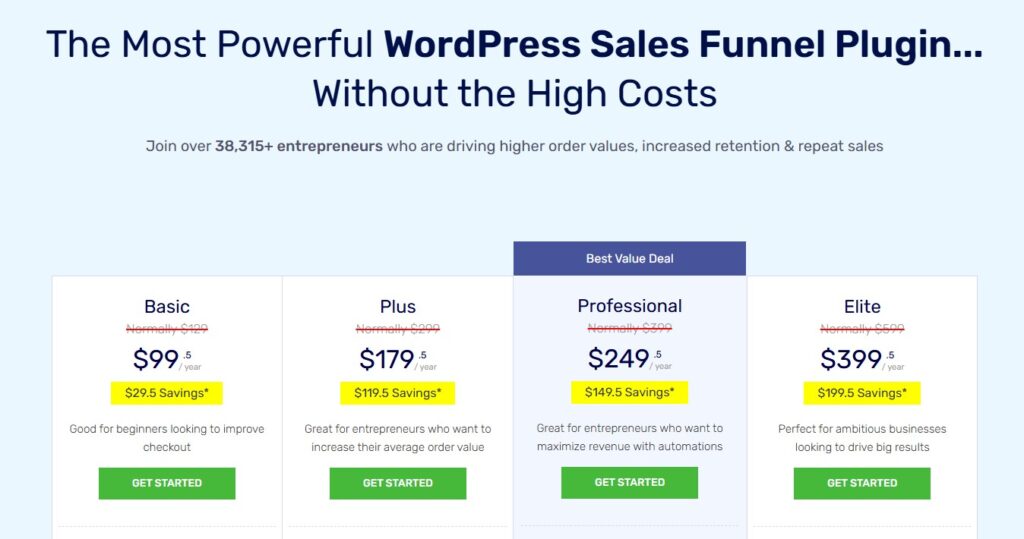
Initially designed as WooFunnels, FunnelKit has evolved into a unified solution for WordPress-based ecommerce stores seeking to maximize their sales potential.
Platform Overview
FunnelKit combines two powerful tools: Funnel Builder and FunnelKit Automations, serving over 38,315 entrepreneurs. The platform primarily focuses on optimizing WooCommerce stores through advanced checkout processes and marketing automation.
FunnelKit Store Features
The platform’s Store Checkout feature includes multi-step templates, cart editing capabilities, and abandoned cart recovery tools. Uniquely, FunnelKit offers dynamic rule-based offers, allowing merchants to display targeted upsells based on customer behavior, cart items, and purchase history.
Integrations
FunnelKit connects seamlessly with numerous platforms:
Form builders: Contact Form 7, Elementor Forms, Gravity Forms
Learning platforms: LearnDash
CRM tools: ActiveCampaign, ConvertKit, Drip
Payment processors: Stripe, PayPal
FunnelKit Pricing Options
The platform offers four pricing tiers:
Basic: USD 129/year (1 site)
Plus: USD 299/year (2 sites)
Professional: USD 399/year (2 sites)
Elite: USD 599/year (30 sites)
Pros and Cons
Advantages:
Advanced cart abandonment tracking
Built-in A/B testing capabilities
Visual automation builder
Extensive template library
Limitations:
Higher pricing compared to competitors
Requires reliable web hosting
No built-in affiliate program
FunnelKit Shopping Cart Integration
The platform’s side cart feature enables dynamic product recommendations and one-click additions. Notably, FunnelKit’s cart system supports multiple reward types, including free shipping thresholds and conditional discounts based on cart value.
ConvertFlow

With over 60,000 fast-growing brands utilizing its services, ConvertFlow has established itself as a versatile ecommerce funnel builder focused on converting website traffic into revenue.
Platform Overview
ConvertFlow’s funnel builder combines landing pages, forms, popups, and quizzes in one unified dashboard. Primarily designed for brands and marketers, the platform enables quick launch of conversion-focused campaigns without requiring coding expertise.
ConvertFlow Ecommerce Tools
The platform’s core features include:
Quiz funnels for product recommendations
Multi-step forms with field pre-filling
Cart abandonment recovery tools
Product bundle builders
Post-purchase upsell offers
Integrations
The platform simultaneously connects with over 1,500 applications through Zapier and Segment. Direct integrations include major platforms like Shopify, ActiveCampaign, HubSpot, and Klaviyo.
ConvertFlow Pricing Structure
The platform offers value-based pricing tied to active leads. Markedly, the pricing structure includes:
Free Plan: 5 campaigns with preview capabilities
Plus Plan: Enhanced features with custom domains
Enterprise: Custom solutions with white-glove support
Pros and Cons
Advantages:
Extensive template library with 300+ options
Real-time email and phone verification
Advanced targeting conditions
Two-way CRM synchronization
Limitations:
Limited reporting capabilities
Data accuracy challenges
Campaign management complexity
ConvertFlow Platform Integration
Forthwith, the platform offers conditional automation paths, eliminating the need for additional Zap creation. The system enriches marketing CRMs with contact information, custom fields, survey responses, and geolocation data for enhanced personalization.
ConvertFlow

With over 60,000 fast-growing brands utilizing its services, ConvertFlow has established itself as a versatile ecommerce funnel builder focused on converting website traffic into revenue.
Platform Overview
ConvertFlow’s funnel builder combines landing pages, forms, popups, and quizzes in one unified dashboard. Primarily designed for brands and marketers, the platform enables quick launch of conversion-focused campaigns without requiring coding expertise.
ConvertFlow Ecommerce Tools
The platform’s core features include:
Quiz funnels for product recommendations
Multi-step forms with field pre-filling
Cart abandonment recovery tools
Product bundle builders
Post-purchase upsell offers
Integrations
The platform simultaneously connects with over 1,500 applications through Zapier and Segment. Direct integrations include major platforms like Shopify, ActiveCampaign, HubSpot, and Klaviyo.
ConvertFlow Pricing Structure
The platform offers value-based pricing tied to active leads. Markedly, the pricing structure includes:
Free Plan: 5 campaigns with preview capabilities
Plus Plan: Enhanced features with custom domains
Enterprise: Custom solutions with white-glove support
Pros and Cons
Advantages:
Extensive template library with 300+ options
Real-time email and phone verification
Advanced targeting conditions
Two-way CRM synchronization
Limitations:
Limited reporting capabilities
Data accuracy challenges
Campaign management complexity
ConvertFlow Platform Integration
Forthwith, the platform offers conditional automation paths, eliminating the need for additional Zap creation. The system enriches marketing CRMs with contact information, custom fields, survey responses, and geolocation data for enhanced personalization.
Funnelish
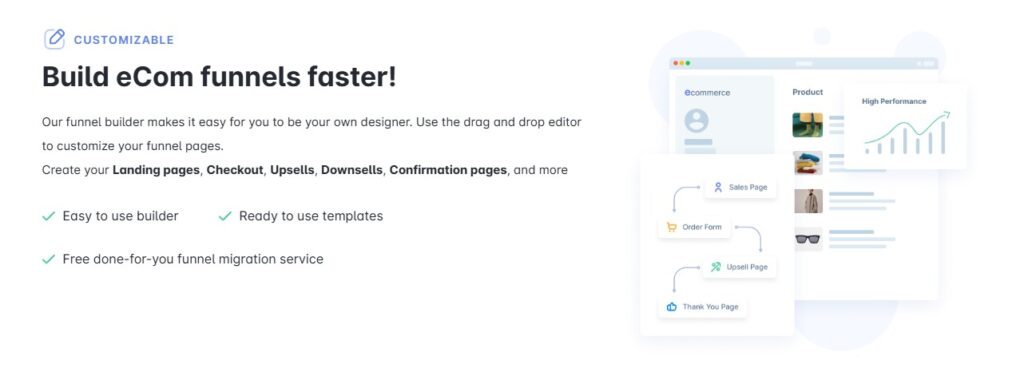
Designed as a comprehensive ecommerce solution, Funnelish empowers businesses to build high-performance sales funnels that boost conversion rates and streamline order fulfillment.
Platform Overview
Funnelish combines a drag-and-drop funnel builder with powerful automation tools to help entrepreneurs create and optimize their online stores. The platform excels in page speed optimization, ensuring all funnel pages load in less than one second.
Funnelish Store Features
The platform’s Store Checkout capabilities include:
Multi-payment gateway support
Order bump functionality
One-click upsells
Customizable checkout forms
Primarily, Funnelish stands out with its workflow automation features, enabling automatic order processing and customer communication through built-in email sequences.
Integrations
The platform seamlessly connects with multiple services:
Payment processors: Stripe, PayPal, Klarna, NMI
Email platforms: Klaviyo, ActiveCampaign, Mailchimp
Fulfillment: Shopify, ShipStation
Analytics: Google Sheets, Hyros
Funnelish Pricing Plans
The platform offers three main tiers:
Basic: USD 49.00/month (20,000 visitors, 20 funnels)
Intermediate: USD 79.00/month (100,000 visitors, 100 funnels)
Advanced: USD 199.00/month (unlimited visitors and funnels)
Pros and Cons
Advantages:
Record page speed of 0.1 seconds
Extensive automation capabilities
Zero transaction fees
24/7 customer support
Limitations:
Limited workflow automations in lower tiers
Basic email marketing features
Restricted custom domain options
Funnelish Shopping Platform Integration
The platform ultimately offers direct Shopify integration, enabling automatic order fulfillment with zero transaction fees. Meanwhile, the built-in SMTP provider support facilitates seamless email communication through your preferred email marketing service.
GoHighLevel
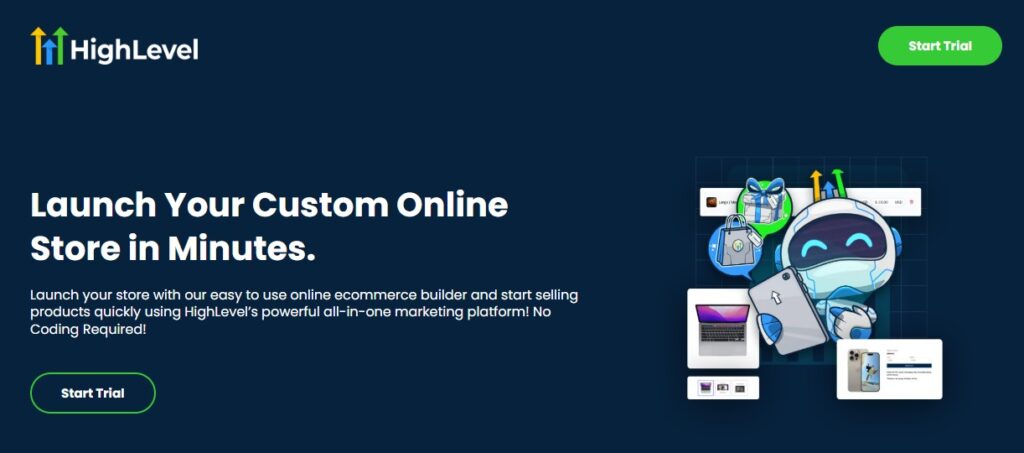
Fundamentally designed as a white-label marketing CRM, GoHighLevel serves agencies, consultants, and marketers seeking to scale their operations.
Platform Overview
The platform combines sales, marketing, and CRM functionalities into a unified dashboard. Presently, GoHighLevel offers tools for creating full-featured websites with custom menus, alongside capabilities for capturing leads through surveys and forms.
GoHighLevel Ecommerce Features
The platform’s recent ecommerce expansion includes tools for physical product sales. Key capabilities encompass:
Product listing creation with variants
Basic inventory tracking
Automated cart abandonment recovery
Multiple currency support
Integrations
GoHighLevel supports four major payment gateways: Stripe, NMI, Authorize.net, and PayPal. The platform evidently excels in marketing integrations, connecting with Facebook, Instagram, TikTok, and Google for enhanced campaign management.
GoHighLevel Pricing Options
The platform offers two primary subscription tiers:
Agency Starter: USD 97.00/month (includes 2 sub-accounts)
Agency Unlimited: USD 297.00/month (unlimited sub-accounts)
Pros and Cons
Advantages:
Unlimited features at affordable pricing
Advanced automation capabilities
AI-powered booking bot integration
Constant platform updates
Limitations:
Basic inventory management
Limited product fulfillment options
Manual shipping number input required
GoHighLevel Platform Compatibility
The system undoubtedly maintains high reliability through Amazon Web Services hosting. Notably, the platform offers API access for custom integrations, enabling seamless connection with various third-party applications through Zapier.
LeadPages
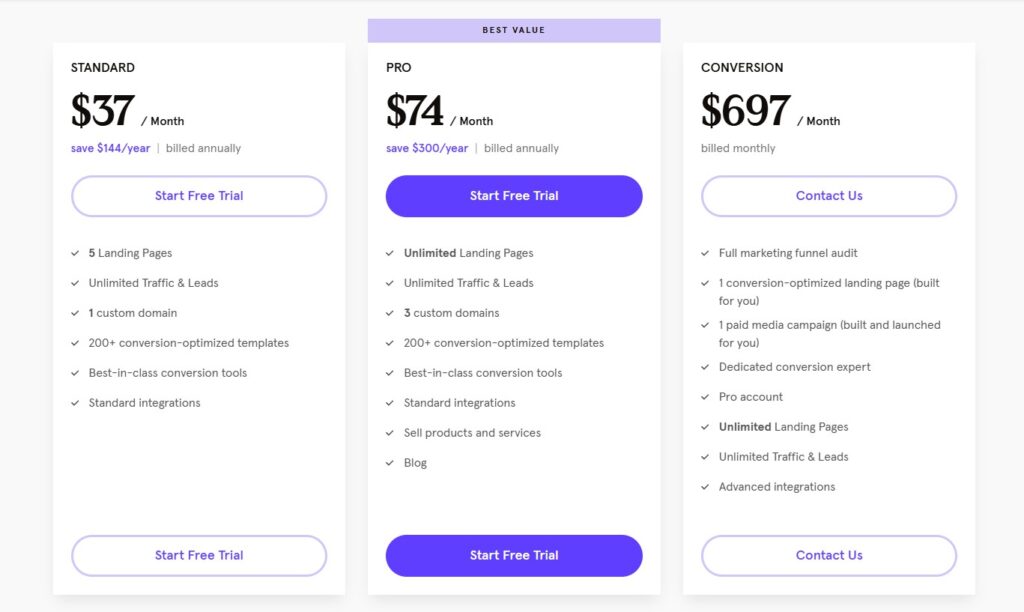
Recognized as a versatile lead generation platform, LeadPages helps businesses create high-converting landing pages and sales funnels.
Platform Overview
The platform’s landing page builder converts up to 5x higher than industry averages. Primarily designed for small and medium-sized businesses, LeadPages offers a comprehensive suite of tools for lead generation and sales optimization.
LeadPages Store Capabilities
The platform’s Store Features include:
Shopify cart integration
Buy button implementation
Multi-item landing pages
Custom thank you pages
Particularly noteworthy is the platform’s ability to load pages 2.4 seconds faster than competitors, alongside a Google performance score 30% higher than other leading page builders.
Integrations
LeadPages connects with over 90 native integrations, including:
Payment processors: Stripe, PayPal
Email services: MailChimp, AWeber, ActiveCampaign
CRM platforms: HubSpot, Salesforce, Marketo
Webinar tools: GoToWebinar
LeadPages Pricing Structure
The platform offers three distinct tiers:
Standard: USD 37.00/month (annual) or USD 49.00/month
Pro: USD 74.00/month (annual) or USD 99.00/month
Advanced: Custom pricing
Each plan includes a 14-day free trial and 7-day money-back guarantee.
Pros and Cons
Advantages:
Affordable pricing compared to competitors
Unlimited traffic across all plans
Over 250 conversion-optimized templates
AI-powered optimization tools
Limitations:
Limited customization options
Basic features in Standard plan
Sluggish drag-and-drop builder
LeadPages Shopping Integration
The platform ultimately offers five methods for Shopify integration:
HTML widget implementation
Direct hyperlinking
Embed code integration
HTML export options
Product collection embedding
Groove.cm
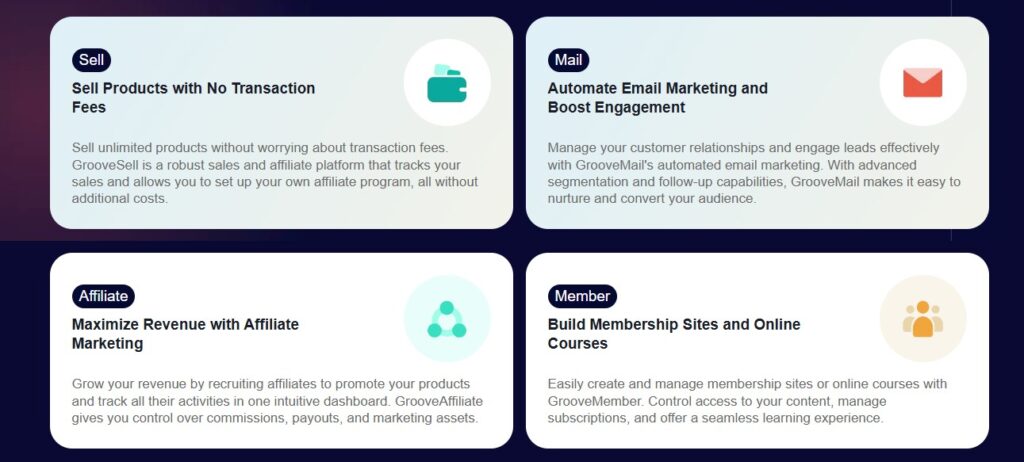
First and foremost, Groove.cm stands as a comprehensive digital business platform, serving over 550,000 users with its all-in-one marketing and sales solution.
Platform Overview
The platform combines sales funnel creation, marketing automation, and CRM functionalities into a unified system. In addition to basic features, Groove.cm offers unlimited hosting and bandwidth without extra charges based on traffic size.
Groove.cm Ecommerce Tools
The platform’s Store feature delivers robust capabilities for both physical and digital product sales. Key functionalities include:
Unlimited product listings
Custom domain implementation
Built-in SEO tools
Automated webinar capabilities
Integrations
The platform seamlessly connects with numerous third-party applications through Zapier. As a result, merchants can integrate with:
Payment processors: Stripe, PayPal
Email platforms: SendGrid, MailGun
CRM systems: Salesforce, HubSpot
Shopping platforms: Shopify, Recharge
Groove.cm Pricing Plans
The platform currently offers five distinct pricing tiers:
Free Plan: USD 0.00 (500 contacts, 2,500 emails/month)
Creator: USD 149.00/month (5,000 contacts, 50 videos)
Pro: USD 199.00/month (30,000 contacts, unlimited emails)
Premium: USD 299.00/month (50,000 contacts, unlimited features)
Premium+ Lifetime: USD 2,497.00 (unlimited everything)
Pros and Cons
Advantages:
Unlimited custom domains in paid plans
Zero platform fees in premium tiers
Comprehensive affiliate program management
Built-in video hosting capabilities
Limitations:
Support response times need improvement
Limited features in free plan
Restricted posting in community groups
Groove.cm Platform Integration
The platform offers direct API connections alongside webhook support. In particular, the system enriches marketing CRMs with contact information, custom fields, and geolocation data for enhanced personalization.
Best eCommerce Funnel Builders Comparison Table
Funnel Builder | Starting Price | Key Features | Notable Integrations | Main Advantages | Key Limitations |
|---|---|---|---|---|---|
ClickFunnels | $97/month | – Drag-and-drop editor | – ActiveCampaign | – Advanced sales funnel capabilities | – Higher cost vs competitors |
Free (3 funnels) | – Unlimited storage | – Stripe | – Unlimited file storage | – Basic automation | |
CartFlows | $99/year | – Modern Checkout | – PayPal | – Complete customization | – Requires WordPress |
Kartra | $119/month | – Checkout pages | – Stripe | – Zero transaction fees | – Limited blogging |
FunnelKit | $129/year | – Multi-step templates | – Stripe | – Advanced cart tracking | – Higher pricing |
ConvertFlow | $29/month | – Quiz funnels | – Shopify | – 300+ templates | – Limited reporting |
Funnelish | $49/month | – Multi-payment support | – Stripe | – Fast page loading | – Limited workflows in lower tiers |
GoHighLevel | $97/month | – Product variants | – Stripe | – Unlimited features | – Basic inventory management |
LeadPages | $37/month | – Shopify integration | – Stripe | – Affordable pricing | – Limited customization |
Groove.cm | Free tier available | – Unlimited products | – Stripe | – Unlimited domains | – Slow support response |
Conclusion
Selecting the right ecommerce funnel builder depends on your specific business needs and technical requirements. ClickFunnels stands out for advanced sales capabilities, while Systeme.io offers a compelling free tier for beginners. CartFlows excels at WordPress integration, and Kartra delivers robust automation features.
Rather than focusing solely on pricing, consider each platform’s unique strengths. Funnelish delivers lightning-fast page speeds, ConvertFlow specializes in quiz funnels, and FunnelKit provides advanced cart abandonment tools. GoHighLevel, LeadPages, and Groove.cm each target different segments with specialized features like AI-powered optimization and unlimited domain support.
The best choice ultimately depends on several factors:
Budget constraints and pricing structure preferences
Required integration capabilities
Technical expertise level
Specific feature requirements
Platform scalability needs
Start by testing free trials and basic plans before committing to a paid subscription. Many platforms offer money-back guarantees, allowing risk-free exploration of their features. Remember that switching platforms later can be challenging, so carefully evaluate long-term needs alongside immediate requirements when making your decision.
FAQs
What is an ecommerce funnel and why is it important?
An ecommerce funnel represents the customer’s journey from initial awareness to final purchase. It’s crucial because it helps businesses understand and optimize each stage of the buying process, ultimately leading to increased conversions and sales.
How do ecommerce funnel builders differ from regular website builders?
Ecommerce funnel builders are specifically designed to create optimized sales pathways, offering features like upsells, order bumps, and abandoned cart recovery. Regular website builders focus more on general site design and may lack these specialized conversion-oriented tools.
What key features should I look for in an ecommerce funnel builder?
Look for drag-and-drop editors, customizable templates, integration capabilities with payment gateways and email marketing tools, A/B testing features, and analytics to track funnel performance. Advanced options like abandoned cart recovery and dynamic upsells can also be valuable.
Are there any free ecommerce funnel builders available?
Yes, some platforms offer free tiers or trials. For example, Systeme.io provides a free plan with basic features, while others like ClickFunnels and Kartra offer free trials. However, paid plans typically offer more advanced features and higher limits on contacts and funnels.
How do I choose the right ecommerce funnel builder for my business?
Consider your budget, technical skills, required integrations, and specific feature needs. Evaluate factors like ease of use, scalability, and customer support. It’s recommended to try out free trials of different platforms to find the best fit for your business goals and workflow.

